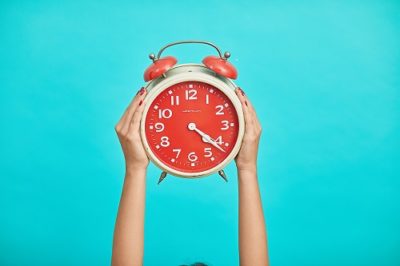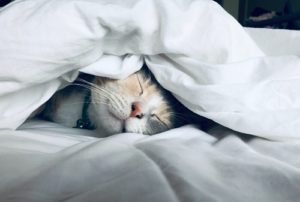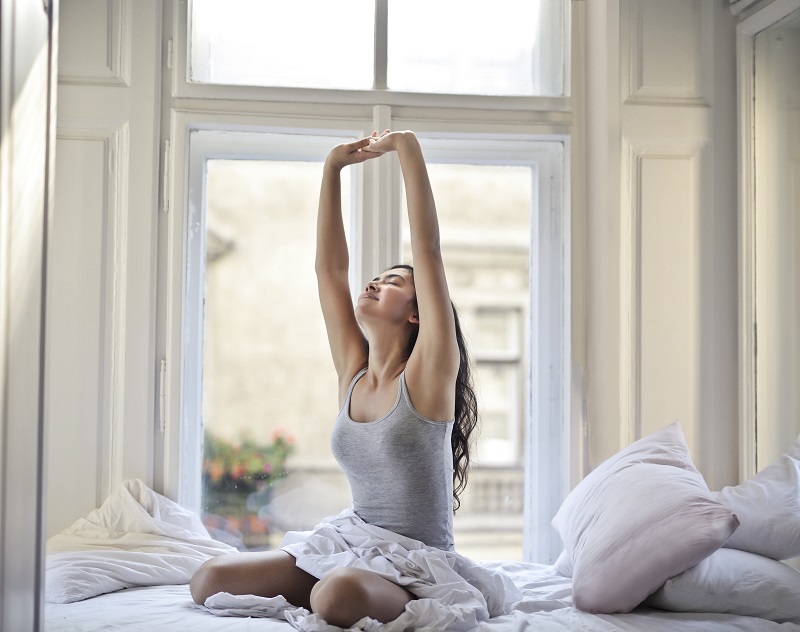1. Go to bed at the same time every night
You know how a sleep schedule is really important for young children? Well I’ve got news for you… it’s really important for older children too– meaning you. Going to bed and waking up around the same time each day (even on weekends) helps to keep your circadian rhythm on track. Your circadian rhythm is your bodies internal clock and it’s really really important for your metabolism, core body temperature, cortisol levels, and your sleep-wake cycle, among other things. Keeping a schedule helps your body know when you should be awake and when you should be asleep. This means less time staring at the ceiling counting sheep.
Going to sleep around the same time each night may also help cut down on sleep latency– the horrible time you spend in bed tossing and turning, but not actually sleeping.
There are so many benefits of getting good consistent sleep, but one is a boosted metabolism. One study actually found that people with irregular sleep patterns had higher rates of metabolic problems like insulin resistance.

2. Dim your lights
Blue light, which is found in digital devices like your phone, TV, and LED lights, disrupts the production of melatonin. Melatonin is a hormone, which controls your sleep-wake cycle. Our body has an internal clock that is set by the amount of light we are exposed to. In a perfect world we would wake up when the sun rises and go to bed when the sun sets. When our eyes detect light it sends a signal to the brain that it’s time to start waking up. Same thing happens when it gets dark outside, except the brain releases melatonin, which gets the body ready for sleep. But in todays world everything is sort of wonky. So what can we do?

- An hour before bed begin to dim your household lights
- At least 30 minutes (but preferably an hour) before bed put your phone, tablet, TV, and any other sort of electronic devices away. Sometimes you just can’t though and that’s OK because we’re human. Thankfully, there are some things you can still do to avoid blue light near bedtime. Most smart phones have a Night Shift setting that changes the colors on the screen to warmer orange tones, Learn how. For Android users there is an app called Twilight, which does the same thing. You can also use an app called Flux which works on Windows, Mac, and Linux.
3. Keep your room as dark and cool as possible
Wanna know what doesn’t scream “Mmm that was a great nights sleep”? A hot stuffy room. Wanna know why? Just before we fall asleep our body temperature drops. This drop in temperature is thought to help promote sleep.
Sleeping in a cooler room may help your body reach this point faster, so you can fall asleep quicker. A cooler room also helps improve the production of melatonin.
Keep your room between 60-67 degrees. Above 75 degrees and
below 54 degrees can negatively impact your sleep.
4. Avoid coffee or stimulants in the afternoon
This is a pretty self explanatory one. Caffeine is a stimulant, and stimulants are meant to keep you awake. If you’re having trouble sleeping stay away from any sort of caffeine after 3pm, even if you claim not to feel the effects of caffeine. No harm in cutting back to see what happens.

5. Meditate
Anxiety and stress is one of the main reasons people report not being able to fall asleep, or the reason they wake up in the middle of the night (that and having to pee). Meditation works wonders for stress and anxiety. I personally use the Headspace app daily. They have some great meditations geared towards falling asleep. The 4-7-8 breath also works wonders for combatting stress and anxiety.
6. Reduce long naps during the middle of the day

7. Reduce alcohol
This one is a toughie because I’m sure many of us have experienced the effects of alcohol actually putting us to sleep. And it does. Alcohol helps us fall asleep and sleep deeper, but it also reduces REM sleep (rapid eye movement).
REM sleep is thought to be the most restorative sleep. It’s also where you dream. The more you drink before bed, the more pronounced these effects become. If you’re having any problems sleeping keep your alcohol consumption to one glass a night or less.
Interested in ways you can eat for better sleep?

